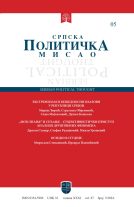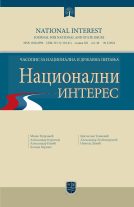- Home page
- Researchers
- Dr. Ljubiša Despotović, President of the Scientific Council
Dr. Ljubiša Despotović, President of the Scientific Council

- Address: /
- Email: ljubisa.despotovic@lux-dog.com
- Telephone: /
- LinkedIn: /
Ljubiša Despotović, (Temerin, 1962), Principal Research Fellow, president of the Scientific Council, head of the Center for Political Theory at the Institute for Political Studies in Belgrade and full professor. He is a member of the presidency of the Association for Political Sciences of Serbia and a regular member of Matica Srpska. He is a member of the editorial board of the international scientific journal Studia Sekuritatis (Romania), the editorial board of the scientific journal Serbian Political Thought, as well as the editorial board of the National Security Policy yearbook.
The founder and editor-in-chief of the scientific journal "Culture polis" from 2003 to 2021. Participant of numerous scientific conferences and gatherings, author and co-author of more than two hundred scientific papers, as author and editor of more than twenty scientific monographs, anthologies and chronologies.
He received professional training at: Georg Eckart Institute, Braunschweig, FR Germany; Institute for Historical Justice and Reconciliation, The Hague, The Netherlands; Global Seminar, Salzburg, Austria and Instituto Tres Kulturas, Seville, Spain. He was the team leader of the international scientific project Mapping national identities in the territory of the former Yugoslavia, which was led by prof. Dr. Elazar Barkan from Columbia University in New York.
More important works: Politics at the border between power and authority (2022), Novi Sad, Contemporary international relations and geopolitics (2021), Sremski Karlovci, co-author; Serbian political modern: Serbia in the processes of political modernization of the 19th century (2020), Sremski Karlovci; Geopolitics of Svetosavlja: the Serbian national question in the historical range from baptized to natural Serbia (2019), Sremski Karlovci, Globalization and geopolitics of identity, (2017) Sremski Karlovci, Geopolitics of destruction (2015), Sremski Karlovci.

POSTHUMANISM: HISTORY, GOALS AND IMMINENT PERILS
The Paper studies the origin, development, main representatives, and basic characteristics of the posthumanist movement, its normative positions and goals (including its relation towards technology and nature), as well as the similarities and differences between modern posthumanism and transhumanism. In order to compare the posthumanist movement with humanistic modernism and notice their basic similarities and differences, which are crucial for understanding the relationship of man and technology towards natural conditions, the second part of the Paper points out the basic characteristics of modern humanistic anthropocentrism and its attitude towards technique. The final part of the Paper concerns the critique of posthumanism from the perspective of Christian personalism, which opens up possibilities for us to have a different view of the problems of postmodern living that posthumanism wants to overcome.

ANTI-YUGOSLAVISM AS AN ANTI-SERBIAN PLATFORM FOR POLITICAL AND MILITARY COOPERATION BETWEEN THE USTASHAS AND COMMUNISTS WITHIN THE KINGDOM OF YUGOSLAVIA AND DURING THE WAR ON THE TERRITORY OF THE INDEPENDENT STATE OF CROATIA
The anti-Yugoslavism of the communist and Ustasha’s movements, which was one of the dominant political postulates but also a serious action platform between the two wars, has already been partially written about in our historiography. What we want to draw attention to is the fact that behind such anti-Yugoslavism, sometimes hidden and sometimes publicly, anti-Serbism was highlighted as the common denominator of the political actions of both ideological options. Although differently politically motivated and ideologically explained, in the last resort of the Ustashas and communists, anti-Yugoslavism was essentially anti-Serbian. It is precisely this relationship that we want to analyze in the first part of our work assignment, while we will, first of all, present their active and coordinated cooperation in the second part using examples during the Second World War that most often took place on the territory of the Independent State of Croatia, because Josip Broz's partisans spent most of the time of the war staying in that territory, with abundant logistical support, coordination and tolerance of all state and military formations of Pavelic's criminal regime.

GEOPOLITICAL IDENTITY OF THE REPUBLIC OF SERBIA AND STRATEGY OF NATIONAL SECURITY
In this paper, we deal with the essential question of whether and in what way the current National security strategy of the Republic of Serbia properly valorizes the geopolitical identity of Serbia and the complex geopolitical position of the Serbian people in the Balkans. We define geopolitical identity as the identification of geopolitical self-awareness and continuity in the time and space of a nation, as a relatively objectifying identity-geographical property of a national or religious group which is related to its specific spatial, cultural-civilizational, religious-confessional and political-state form of existence. Thus, the Serbian geopolitical identity is tellurocratic and is the result of historical forced processes of ethno-spatial repression from the Adriatic coast, unification, conversion to Catholicism, Montenegrinization etc. Apart from the characteristics of a territorially locked country, we would like to point out that Serbia has an island position being surrounded by the member states of one alliance and thus isolated within its territorial space. Serbia is surrounded by NATO member countries and as a result, it faces pressures and has difficulty communicating with potential partners, etc. and if relations deteriorate, it will face military, economic, energy and traffic isolation and sanctions. The specificity of the position of the Balkans and thus of Serbia and Serbian countries, creates a geopolitical magnetism that attracts global and regional powers. The parallel and intertwined interests of these forces create a geopolitical knot in this area as a very important geopolitical feature. These are strategic movements and wedges from several different directions. Russia is trying to coordinate the northeast-southwest direction towards the Mediterranean and warm seas. The German factor has been projecting the direction of movement northwest-southeast for decades. The Islamic factor follows the southeast-northwest direction towards the heart of Europe. The United States is expanding its influence in the southwest-northeast direction and is trying to control most other directions, especially those that extend from the circles of their allies. Finally, China is emerging as a new factor projecting the direction of movement to the west, including the Balkans (China + 17 Initiative), which further complicates Serbia's geopolitical position. Therefore, Serbia and Serbian countries are in a dynamic zone that’s geopolitical, geostrategic and geoenergetic characteristics are the key to preserving the global position of the world’s great powers.

AMERICAN MILITARIZATION OF EUROPE AT THE BEGINNING OF THE 21ST CENTURY AS A MALIGNANT EXPLICATION OF THE CONTINUITY OF ANGLO-SAXON GEOPOLITICAL DOCTRINE
In this work, we will seek to show the continuity of Anglo-Saxon geopolitical doctrines and the strategy of American conquest and militarization of Eastern and Southeastern Europe in a time continuity from the beginning of the Cold War to the present. In order to understand and adequately respond to the topic and subject of the research we will devote the introductory part to the key Anglo-Saxon geopolitical doctrines that underlie American strategy, internal political organization and foreign policy. Then we will analyze the Cold War division of the world in order to locate the application of geopolitical doctrines in American strategic emergence on the Eurasian continent and the reasons for the progressive militarization of the world. Finally, we will analyze contemporary developments in international relations to indicate the continued application and innovation of Anglo-Saxon geopolitical doctrines with particular reference to the effects of American action on Serbia and the Serbian people. Although outwardly "perfectly secured America has embarked on the path of" cultural and moral destruction "at the beginning of the 21st century. Nevertheless, the United States is still managing to maintain key zones on the border with Russia, expanding NATO, installing military infrastructure , bases and PRO systems by causing low-intensity conflicts and interfering in the domestic politics of countries in the hemisphere.The zone of Eastern and Southeastern Europe is largely under American control and potential Russian returns are trying in every possible way to prevent, most notably in the Balkans, the destruction of Serbs and Serbian countries. By supporting aggressive neighbors, occupying the Serbian territory of Kosovo and Metohija, building a modern-equipped Bondstil military base, destroying Serbia's political, economic, economic and military systems the United States has strengthened its strategic port in the Balkans. Serbia, on the other hand, has been in a difficult and gloomy struggle for many years on its way to the European Union, and knowing what conditions the West imposes on us, we are right to wonder whether it is a "Long Journey in Europe and / or an Attempt at Civilization for the Conversion of the Serbian People" ?

Is Nation State Still Possible? – Dissolution of State-Centric Order of Modernity –
In this paper we will attempt to show how modern nation-state model is jeopardized by current globalization trends to the extent that its institutions are being dissolved and fundamental functional framework is at risk. The dissipation of the state-centric order of Modernity has been advancing at an acute pace over the last few decades in the context of complex measures undertaken by neoliberal politics. The consequences of these processes are: challenged state sovereignty, institutional dissipation, destroyed economy base, threatened basic security, trend of identity re-coding, reduced spending on social welfare and the overall large-scale pauperization of citizens.

Negative Aspects of Social Capital (Non-Social Capital) as Factors of a Slow Development of Institutional Capacities in Serbia
This paper attempts to examine mutual relations between pre-modern and modern forms of social capital, as well as their impact on the overall social capacities of a society in transition, as Serbian society is today. It also examines the relationship and the correlation between the so-called democratic values and civil society and the total flow of democratization of the modern political order emerging in Serbia. The ways a semi-peripheral and pseudo-modern society can, based on some pre-modern forms of social capital, build a community that should become modern and prosperous according to its projected capacities. And whether it is possible to build and adopt the values that raise the capacity of the democratic political system and the general level of political culture in Serbia through political socialization and interiorisation.

Political Myths of Liberalism: Freedom, Power and Inequality
Power and inequality have been established as dominant postulates of liberal political and economic constitution, as the highest values around which its political-economic essence is being constituted. Nevertheless, there are numerous myths which surround this hidden core of liberal political practice. This essay will provide an analysis of various liberal myths: from liberal state, through the connection between liberalism and democracy, to globalization. In the second part of this essay, the focus will be on Serbia and its modern history regarding “implementation” of liberal ideology and its practices.
